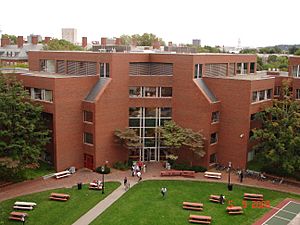Harvard Institute of Politics facts for kids
| Established | 1966 |
|---|---|
| Mission | To inspire students to consider careers in politics and public service. |
| Director | Setti Warren |
| Owner | Harvard Kennedy School |
| Coordinates | 42°22′17″N 71°07′20″W / 42.37145°N 71.12210°W |
| Address | 79 John F. Kennedy St, Cambridge, Massachusetts, U.S. |
The Institute of Politics (IOP) is a special part of the Harvard Kennedy School at Harvard University. It was created to honor President John F. Kennedy and to inspire students at Harvard to consider jobs in politics and helping the public.
Contents
History of the IOP
After President John F. Kennedy was sadly assassinated in 1963, people raised over $20 million. This money was for building the John F. Kennedy Presidential Library and Museum and for creating a special institute at Harvard University. This institute would focus on studying politics and public service. More than 30 million people, including many school children, helped raise this money. In 1966, the money was given to Harvard University to start the Institute of Politics.
The IOP does not offer regular classes or degrees. Instead, it hosts events and programs. One important place at the IOP is the John F. Kennedy Jr. Forum. This forum is located at the Harvard Kennedy School. It often hosts speeches, debates, and group discussions.
Since it opened in 1978, the Forum has held over 1,000 events. More than 650,000 people have attended these events in person. Millions more have watched them on TV or online. The forum was first called the KSG Forum. In 2002, it was renamed to honor the president's son, who had been on the IOP's board. The forum was updated in 2003.
IOP Student Organizations
The Institute of Politics has several groups run by students. These groups help students get involved in politics and public service.
Harvard Votes Challenge
In 2018, students at the IOP started the Harvard Votes Challenge (HVC). They worked with another group called the Ash Center for Democratic Governance and Innovation. This program encourages students, staff, and teachers at Harvard to register and vote. During the 2018 elections, HVC started a voting challenge with Yale University. In 2019, HVC also helped new students register to vote during their orientation.
For the 2020 election, 390 volunteers from Harvard helped people vote. They did this even during the COVID-19 pandemic. These volunteers sent over 94,000 text messages. They also gave out more than 1,700 stamps to students. They got 121 student groups to promise to help all their members vote.
Harvard Public Opinion Project
The Harvard Public Opinion Project (HPOP) started in 2000. Its goal is to understand what young Americans (ages 18-29) think about politics and public service. Students work with the IOP's polling director, John Della Volpe. They conduct the largest national survey of young adults. They do a quick survey in the fall and a bigger one in the spring. After studying the information, they share their findings with the news media.
Policy Program
The Policy Program is like a student "think tank." Students work together to create ideas for new policies or laws. They do research projects that have helped create new laws. They have also helped start community programs. Their work helps analyze important issues affecting communities and states. They work with groups like senators, federal agencies such as the U.S. Department of Commerce, and international groups like The Peace Corps.
Harvard Political Review
The IOP is also where the Harvard Political Review (HPR) is published. This is a magazine about political topics. It comes out four times a year and is not biased toward any political party. Students from Harvard College write, edit, and manage the magazine.
Senior Advisory Committee
The Senior Advisory Committee helps guide the Institute of Politics. These are experienced individuals who offer advice and support to the IOP's mission.
See also
- Harvard University people
- Center for American Political Studies
 | Isaac Myers |
 | D. Hamilton Jackson |
 | A. Philip Randolph |


